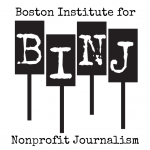PHOTO BY DANA FERRANTE
“The park should be a place where everyone feels welcome, not a place where Indigenous people are made to feel uncomfortable, erased and demeaned.”
After announcements regarding the latest developments surrounding Thomas Ball’s Emancipation Memorial sculpture of Abraham Lincoln beside a kneeling Black man, the Boston Art Commission (BAC) heard public comments regarding the removal of the Christopher Columbus statue that stood in the North End until last month. After its beheading on June 9, the city took the statue into storage on June 11 to “assess the damage” and “historic meaning” but has yet to commit to any permanent arrangement.
Earlier this month, Mahtowin Munro, spokeswoman for Indigenous People’s Day Massachusetts and author of a petition to Mayor Marty Walsh demanding the statue’s removal, asked the BAC for a proper public hearing and process to be put into place for the permanent removal of the statue, citing it as a symbol that for decades has celebrated white supremacy and the genocide of Indigenous people. With more than 5,000 signatures, Munro’s petition also calls for the renaming of Christopher Columbus Park, where the statue stood, and explains, “The park should be a place where everyone feels welcome, not a place where Indigenous people are made to feel uncomfortable, erased and demeaned.”
Notably absent from the public testimony were representatives from the small—by their count, they have 2,380 members—yet vocal Italian American Alliance (IAA). The opinions of their chairman, Frank Mazzaglia, were noted in the Boston Globe in the days after the decapitation.
Following the June beheading, the IAA organized a June 14 rally at the statue, but later canceled the action after Mayor Walsh agreed to meet with the group. Mazzaglia, who deems “the vandalism of [the] statue a hate crime,” said a private meeting with Walsh took place on July 2, in which the IAA asked to have “the statue repaired and returned to its rightful place—but this time with proper security and cameras.” Mazzaglia said his organization represents the “stake holders who actually paid for the statue as well as Friends of the North End and North End residents.”
It’s unclear if the city has any obligation, beyond relational, to those who funded the statue given that it is on city property.
Compared to Mazzaglia’s unrelenting call to teach the “true history of Columbus,” the volunteer-run nonprofit organization Friends of Christopher Columbus Park (FOCCP) has been ambivalent about its vision for the future of the area. Nearby to the now-empty pedestal, a flier on a small message board claims that the present FOCCP had nothing to do with the statue’s erection (the pedestal’s front reads “Erected by Friends of Christopher Columbus Committee”). The FOCCP says it will continue to care for the park, even if “the future of the park name may not be clear at the time.”
Calling the June 9 beheading an act of vandalism, the FOCCP posted a similar message on its website, stating its mission to make the park a “welcoming and safe place for all who visit.” A representative for the group declined to comment further on the statue or the renaming.
At the BAC hearing, Heather Levell, cofounder of the group Italian Americans for Indigenous Peoples’ Day (IPD), echoed Munro’s calls to permanently remove the statue and rename the park, stating her group “stands in solidarity with thousands of Indigenous people from many tribal nations who live in the Boston area.” An Indigenous ally group that provides “an anti-racist counternarrative” to pro-Columbus Italians, Italian Americans for IPD recognizes “the selection of Columbus and his establishment as an Italian figure was a political one designed to enable Italian American immigrants to align with whiteness.” Levell explained, “[Italian Americans] are deeply rooted in whiteness and this country’s institutions, and so it is our responsibility to reflect on that privilege, its roots, and understand the ongoing harm Columbus veneration does to the Native community.” [Note: the renaming of public parks is under the purview of Boston’s Parks and Recreation Commission, not the BAC.]
Another public hearing participant, urban planner Pierre Belanger, questioned the validity of the historical information on the BAC site regarding the statue, claiming public documents show that neither the statue nor the naming of the park were ever officially approved.
Though Columbus now sits in city storage, the pedestal atop which he stood remains in the waterfront park. For Ewa Matyczyk, Ph.D., author of the 2018 report “An Opportunity for Change” (which was commissioned by the BAC to examine the national and local dialogue around monuments and their removal), “the granite base … is much more interesting than the Columbus figure.” Describing the statue as “generic” and of little “artistic merit” in the report, Matyczyk values the pedestal that overflows with names, “because it is here that a human ingredient is most pronounced as evidence of community, collaboration, and determination.”
In response to the idea of letting the pedestal stand without its figurehead as a marker of Boston’s Italian-American pride, IAA Chairman Frank Mazzaglia said, “Dumb idea—not worth responding to.”
While the agenda for an upcoming Aug 11 BAC public hearing has not been posted, the future of the Columbus statue seems likely to make the cut. Whether pro-Columbus groups like it or not, “if something is present in public space, then it’s sending messages about what a society deems valuable and right,” Matyczyk explained. “If we are going to want to have a healthy democracy, that needs to be reckoned.”
The next Boston Art Commission meeting is scheduled for 8.11.20, 4-6pm. Location TBD, but most likely via Zoom. The commission encourages public input and can be reached at BAC@boston.gov.











